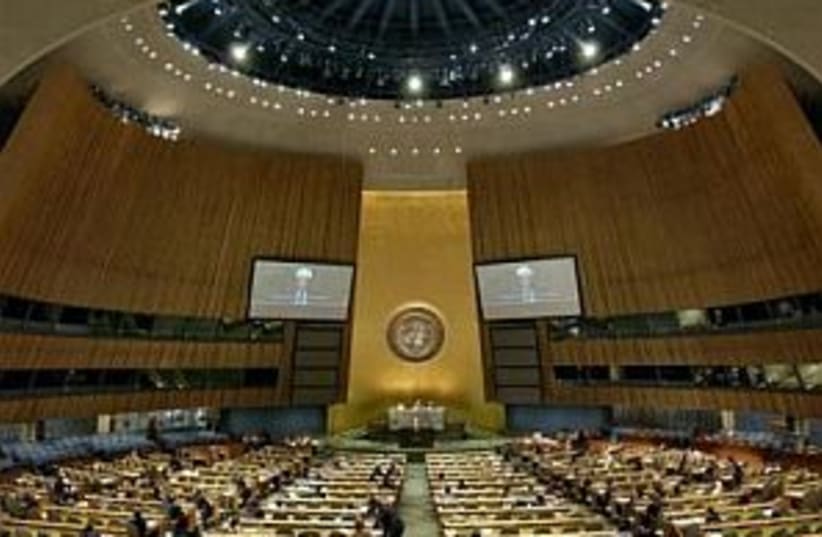According to UN and American officials, an arrangement of this kind, which would include a pair of Security Council resolutions, is now within reach.
Informal talks between the United States, France and Britain over the past few days have led to a compromise position bridging the divide over timing and sequence that split the American and French proposals. Although one substantial obstacle remains, officials believe a vote on the first of two resolutions will most probably occur early next week.
The French, and most of the rest of the world, have demanded an immediate cease-fire before any talk of a longer-term solution, including the formation of a stabilization force and the creation of a buffer zone in south Lebanon.
The American and Israeli position, on the other hand, has been that in order to attain what President George W. Bush is calling a "sustainable" cease-fire, the issue of a multinational force must be resolved before the fighting ends.
The solution to these divergent positions has come in the form of two resolutions. The first, to be voted on in the coming days, will establish a "cessation of hostilities" and articulate a political framework for the future.
Israeli officials said that this document would likely be similar to a statement issued by the G-8 soon after the crisis began last moth, and include a call to release the captive Israeli soldiers, for a cessation of hostilities, and for beefing up the Lebanese army.
The US is also interested in inserting a clause in this resolution calling for an economic boycott of any country that supplies weaponry to Hizbullah or any Lebanese militia.
Foreign Minister Tzipi Livni discussed this issue with US Secretary of State Condoleezza Rice during a couple of conversations they had Wednesday evening.
The second resolution, which would follow after an as yet determined amount of time, would set the composition and mandate of a multinational force and the contours of a new buffer zone in southern Lebanon. It would also assert the authority of the Lebanese government and propose help to the Lebanese Army to gain control of its borders.
Israel's position is that the IDF first needs to clear the buffer zone, one currently being carved out by the IDF, in order for the multinational force to move in. Israel wants this force to be "an international army," not an observer force like UNIFIL, but rather one strong enough that it can impose its will.
One major issue still unresolved, however, is who will watch over southern Lebanon in the interim, between the cessation of hostilities and the arrival of a multinational force. The fear is that if Israel cedes control of the territory in this period, Hizbullah will simply reconstitute its forces, rearm, and return the area to where it was before the hostilities began.
There are two possibilities for solving this remaining problem. The IDF could maintain its position until the arrival of an international force, a position clearly favored by the Israeli government and opposed by Lebanon, among other countries. The other option is for the current UNIFIL mission to be beefed up. Its troops could then be integrated into whatever larger, more robust force arrives. Israel, considering UNIFIL to be weak, opposes this solution.
This remains a major point of contention between the American and French. As French Foreign Minister Philippe Douste-Blazy told France-Inter radio on Thursday, "We are working well with the Americans, working night and day. We are advancing toward a common resolution, but we're not yet there. There is still work to do."
The US State Department said Thursday that the administration is trying to get a UN resolution on a cease-fire passed as early as Friday. Spokesman Sean McCormack told reporters Thursday: "We certainly would hope that we could achieve something by Friday," adding that if it does not look possible to get a resolution passed by Friday, the US was prepared "to work all throughout the weekend if necessary to get something done, because we are working on an urgent basis to bring about an end to the fighting in such a way that is lasting and durable."
Rice, in an interview with CNN's Larry King, would not confirm the Friday deadline for a resolution, but noted that there is progress in the talks with France and other UN member states about the language of the resolution.
France has held a lot of leverage in these discussions since it alone has already offered to lead a multinational force. The Americans and British, meanwhile, have already made clear that they would not contribute troops.
One Israeli official said that one of the reasons why the French want to see a cease-fire first, followed by the introduction of the force, is that they are likely to make up a large part of it and don't want to enter an area where they will be shot at. This is less of a factor for the US, the official said, because they will not be sending troops in.
Twice this week the UN has tried to convene a meeting with possible contributors to a force. Both times the French have managed to get the gathering postponed, emphatically stating that they would not begin discussions of a force until a resolution containing a cease-fire and a political framework were voted on.
Meanwhile, Karnit Goldwasser, the wife of one of the two soldiers whose kidnapping triggered the fighting, spoke to reporters on Thursday morning in New York. She said she was concerned that a UN resolution will not include a demand for her husband's return. Officials in Jerusalem, however, said that the return the soldiers would surely be a part of the resolution.

